| Srl | Item |
| 1 |
ID:
124768


|
|
|
|
|
| Publication |
2013.
|
| Summary/Abstract |
Although party polarization is one of the most significant focal points in the study of contemporary US politics, a limited number of studies have examined its theoretical implications for other countries. In addition, a great deal of effort has been made in the study of the changes in voting bases (i.e., constituencies or interest groups). However, little attention has been given to the features of party organization. In this study we look at the process of polarization between two major parties in Japan in recent years and analyze the way Japanese parties took an alternative path to polarization. We argue that party polarization can be caused by the strategic position-taking of the party executive in addition to the centralization of the party organization.
|
|
|
|
|
|
|
|
|
|
|
|
|
|
|
|
| 2 |
ID:
112622
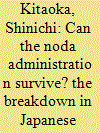

|
|
|
| 3 |
ID:
117077
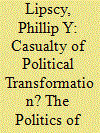

|
|
|
|
|
| Publication |
2012.
|
| Summary/Abstract |
The Democratic Party of Japan (DPJ) came to power in 2009 promising significant transportation sector reform, but it has struggled to implement its proposals. I argue that the DPJ's initiatives faltered due to the legacy of "efficiency clientelism." Historically, Japanese transportation policy combined two imperatives: (1) encourage efficiency by raising the cost of energy-inefficient transportation, and (2) redistribute benefits to supporters of the incumbent Liberal Democratic Party (LDP). Because of the legacy of efficiency clientelism, DPJ campaign pledges-designed to appeal broadly to the general public by reducing transportation costs- ran up against the prospect of sharp declines in revenues and energy efficiency. Efficiency clientelism was well suited to political realities in Japan prior to the 1990s, but recent developments have undercut its viability. This raises profound questions about the sustainability of Japan's energy efficiency achievements.
|
|
|
|
|
|
|
|
|
|
|
|
|
|
|
|
| 4 |
ID:
098381
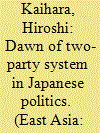

|
|
|
|
|
| Publication |
2010.
|
| Summary/Abstract |
The long rule of the Liberal Democratic Party (LDP) has finally ended, and the Democratic Party of Japan (DPJ) has captured government. This article is to examine why and how that has ended and what are the major factors which have contributed to the change of government. The inability of Japanese opposition parties to capture government has been discussed for a long time. The first part of this article is to examine the strength and weakness of major structural explanations which have been discussed in existing literature. Then, the article proposes a process-level analysis which takes a synergistic effect among institution, strategy and chance seriously. The second part of the article is a short history of the emergence of the Democratic Party of Japan (DPJ) as a ruling party. The history will start with a formation of a small political party in September 1996,and describe how a new single-member electoral system shaped the incentives of political actors, how they worked out political strategy under the new system, and how chance affect the success or failure of political strategy.
|
|
|
|
|
|
|
|
|
|
|
|
|
|
|
|
| 5 |
ID:
131392
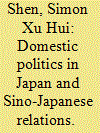

|
|
|
|
|
| Publication |
2014.
|
| Summary/Abstract |
The Sino-Japanese relations have again reached to the lowest point since Koizumi's rule. Contrary to the conventional literatures which explaining the dynamic relation from the international dimensions, this special issue highlights the different domestic actors in Japanese politics who contribute significantly to the foreign policy-making process, notably regarding Japan's Chinese policies. While there is a significant rightward shift in domestic politics and a growing discrepancy between central and local level politicians, the quest for discursive power between the opposing camps in the relevant areas will heavily determine future Sino-Japanese relationships.
|
|
|
|
|
|
|
|
|
|
|
|
|
|
|
|
| 6 |
ID:
006514
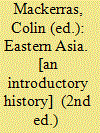

|
|
|
|
|
| Edition |
2nd ed.
|
| Publication |
Melbourne, Longman, 1995.
|
| Description |
xi, 676p.pbk
|
| Standard Number |
0582806607
|
|
|
|
|
|
|
|
|
|
|
|
Copies: C:1/I:0,R:0,Q:0
Circulation
| Accession# | Call# | Current Location | Status | Policy | Location |
| 038249 | 950/MAC 038249 | Main | On Shelf | General | |
|
|
|
|
| 7 |
ID:
161402
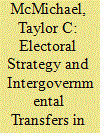

|
|
|
|
|
| Summary/Abstract |
Japanese distributive politics draws scholarly attention as a partial but powerful explanation of the LDP’s electoral dominance via the contention that the LDP rewarded its supporters and punished its opponents. But the empirical evidence disappears when intergovernmental transfers, which can be tracked to electoral constituencies, are examined. Using intergovernmental transfer data, this article tests four separate hypotheses.
|
|
|
|
|
|
|
|
|
|
|
|
|
|
|
|
| 8 |
ID:
098181
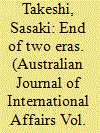

|
|
|
| 9 |
ID:
136709


|
|
|
|
|
| Summary/Abstract |
This article addresses the transformation of the state by exploring the case of Japan’s ICT regulation between the 1980s and 2000s prompted by the challenge to the state after the 1980s. It sets out to challenge the dominant pluralist and rational choice literature in Japanese politics that takes an elitist perspective with the concept of the core executive, referring to the body of statist literature, that employes data drawn from the interview of elites. What emerges from this study is a variation on state transformation with a fluid change of power within the core executive in ICT regulation. This can be understood as a dynamic reconstitution process of the Japanese state in response to the challenges both sector-specific and beyond. Mobilised by the change of power, the reconstitution of the Japanese state has transformed the developmentally-oriented characteristic of the Japanese state led by civil servants. Elsewhere, by focusing on the state at a macro level and power relations within the core executive, this article reveals the dominance of the core executive in ICT regulation. It concludes that the Japanese state has retained dominance over society through its reconstitution mobilised by the core executive within which the fluid change of power has occurred between actors.
|
|
|
|
|
|
|
|
|
|
|
|
|
|
|
|
| 10 |
ID:
181198


|
|
|
|
|
| Summary/Abstract |
Can governments elected under mixed-member majoritarian (MMM) electoral systems use geographically targeted spending to increase their chances of staying in office, and if so, how? Although twenty-eight countries use MMM electoral systems, scant research has addressed this question. The authors explain how MMM’s combination of electoral systems in two unlinked tiers creates a distinct strategic environment in which a large party and a small party can trade votes in one tier for votes in the other tier in a way that increases the number of seats won by both. They then explain how governing parties dependent on vote trading can use geographically targeted spending to cement it. These propositions are tested using original data from Japan (2003–2013) and Mexico (2012–2016). In both cases, municipalities in which the supporters of governing parties split their ballots as instructed were found to have received more money after elections. The findings have broad implications for research on MMM electoral systems, distributive politics, and the politics of Japan and Mexico.
|
|
|
|
|
|
|
|
|
|
|
|
|
|
|
|
| 11 |
ID:
151990


|
|
|
|
|
| Summary/Abstract |
After 60 years maintaining Self-Defense Forces rather than a normal military, Japan is moving towards exercising collective self-defence, long restricted by interpretations of its 1945 Peace Constitution. The merits of Prime Minister Abe Shinzo's ‘proactive pacifism’ are intensely debated by those welcoming greater international contributions from Japan and others suspicious of Japanese ‘remilitarisation’. A nation’s defence posture can theoretically be hijacked by aggressive nationalists, shift to pacifist isolationism, or rely on non-military internationalism or multilateral security cooperation. This article assesses competing explanations about the post-war trajectory of Japan’s defence posture by charting variation in military doctrine and capabilities. The analysis finds that Tokyo has made incremental policy adjustments under domestic and international constraints, and is not aggressively remilitarising.
|
|
|
|
|
|
|
|
|
|
|
|
|
|
|
|
| 12 |
ID:
117640
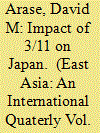

|
|
|
|
|
| Publication |
2012.
|
| Summary/Abstract |
The question posed in this paper is whether the triple disaster of 3/11 constitutes a "critical juncture" in Japan. We can point to minor discontinuities in Japanese policies, institutions, and identity caused by the earthquake, tsunami, and nuclear plant meltdown that eventuated on March 11, 2011, but in the year following the event there was no evidence of a critical change. The disaster and post-disaster situation in Japan are summarized, and an explanation for the lack of critical change in nuclear policy-an area where change might have been expected in view of the fact that European countries reacted to 3/11 with critical changes in nuclear energy policy-is sought by comparing the ability of mainstream theories of Japanese politics to explain the situation.
|
|
|
|
|
|
|
|
|
|
|
|
|
|
|
|
| 13 |
ID:
130612
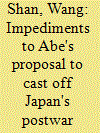

|
|
|
|
|
| Publication |
2014.
|
| Summary/Abstract |
A fundamental change in Japanese politics means that neo-conservatives now are meeting fewer obstacles. The wide margin enjoyed by the Liberal Democratic Party led by Shinzo Abe in Japan' s July 2013 election for the upper house (House of Councillors) was a second resounding victory for the LDP, which had won in the lower house (House of Representatives) at the end of 2012. Whether or not the LDP can assume the long-term reins of government, the party will have a comparatively steady lock on the Japanese political arena in the short term. The so-called "twisted Diet" or "distorted" two-house system that has existed since 2007 will be nonexistent. Abe' s open intention to "cast off the postwar system" translates into a dynamic turn toward increased nationalism, militarism, and domestic repression as the answer to economic stagnation.
Neo-conservatives, led by Abe, seek to convince constituents that economic revival depends on discarding an outdated constitution and creating new rules that favor Japan ' s military might
|
|
|
|
|
|
|
|
|
|
|
|
|
|
|
|
| 14 |
ID:
179275
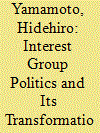

|
|
|
|
|
| Summary/Abstract |
The political reforms that have been going on since the 1990s have drastically changed the face of politics in Japan. The most significant of these reforms was the change of government, which brought an end, albeit only once, to the long-standing Liberal Democratic Party (LDP) regime. These changes were expected to change the power structure by altering the contact of interest groups with political elites. I examine this issue based on a longitudinal survey conducted in four rounds between 1997 and 2017.
The results show a robust structure of interest group politics, although the features were weakening. That is, contacts with the LDP and the bureaucracy were sources of political influence for interest groups. The impact of the two-party system and its setbacks are seen in the change in contact with the Democratic Party of Japan (DPJ). However, The DPJ did not function as a source of interest representation.
|
|
|
|
|
|
|
|
|
|
|
|
|
|
|
|
| 15 |
ID:
113904
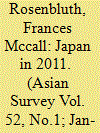

|
|
|
|
|
| Publication |
2012.
|
| Summary/Abstract |
Japan's government under the Democratic Party of Japan has limped along for another year, hampered by a divided legislature and an aging population reluctant to pay for the pensions and services it requires. The natural disasters of March 2011 were a tragic sideshow to the deep political problems that continue to plague Japan.
|
|
|
|
|
|
|
|
|
|
|
|
|
|
|
|
| 16 |
ID:
106723
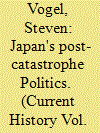

|
|
|
|
|
| Publication |
2011.
|
| Summary/Abstract |
Japan's political leaders have failed to deliver decisive action precisely when the country needed it most-when it faced its most devastating crisis since World War II.
|
|
|
|
|
|
|
|
|
|
|
|
|
|
|
|
| 17 |
ID:
158770
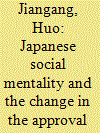

|
|
|
| 18 |
ID:
116628
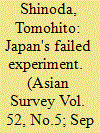

|
|
|
|
|
| Publication |
2012.
|
| Summary/Abstract |
With the establishment of the DPJ government, Prime Minister Hatoyama Yukio introduced a series of institutional changes in order to transform the existing bureaucracy-controlled government and to establish political leadership. These changes, however, created instability and irregularity in Japanese politics. As a result, they were reversed by his successors.
|
|
|
|
|
|
|
|
|
|
|
|
|
|
|
|
| 19 |
ID:
083650
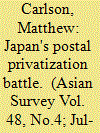

|
|
|
|
|
| Publication |
2008.
|
| Summary/Abstract |
This article argues that the use of campaign finance regulations and electoral rules by political parties significantly shaped the results of the 2005 general election and the battle over postal privatization in Japan. How the Liberal Democratic Party responds to the reverberations of the conflict between the so-called "rebels" and "assassins" is likely to affect its electoral fortunes in the next lower house election
|
|
|
|
|
|
|
|
|
|
|
|
|
|
|
|
| 20 |
ID:
080460
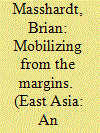

|
|
|
|
|
| Publication |
2007.
|
| Summary/Abstract |
Prime Minister Koizumi's six consecutive annual visits to Yasukuni shrine played a key role in initiating a new phase of domestic citizen political mobilization not seen since the early 1970s. This paper is based on field research during the Koizumi years (2001-2006) centering on domestic groups that conduct activities in "protection" of or "opposition" to Yasukuni shrine. As a study of street-based politics, this paper seeks to uncover the processes, strategies, and outcomes of citizen responses to elite political action at Yasukuni Shrine as well as explore meaning of their actions within the context of Japan's democratic polity
|
|
|
|
|
|
|
|
|
|
|
|
|
|
|
|